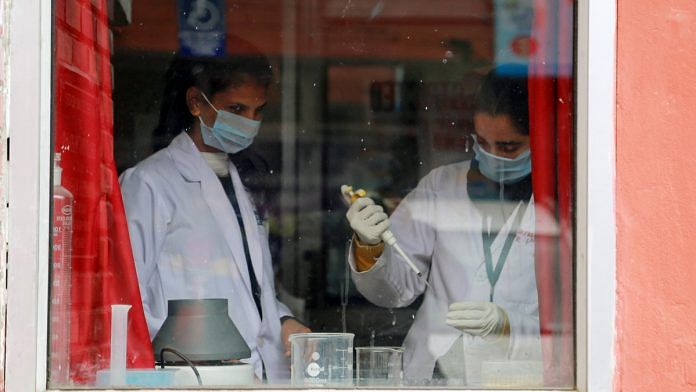New Delhi: The novel coronavirus pandemic has claimed more than 47,000 lives globally. Several countries, its scientists and doctors, have been trying to understand the virus, curb its spread and develop effective treatments.
ThePrint brings you the five top developments on Covid-19 research front across the globe.
Clinical trial to test if malaria drug can prevent Covid-19
A US-based non-profit organisation, Patient-Centered Outcomes Research Institute (PCORI), has approved up to $50 million funding for a randomised clinical trial to test if malaria drug hydroxychloroquine (HCQ) can prevent Covid-19 infections in healthcare workers.
The programme will create a community of healthcare workers interested in understanding the impact of Covid-19 on them and their colleagues, families and friends.
The trial will evaluate the use of HCQ — in preventing Covid-19 infection in exposed healthcare workers and limiting the amount of virus that asymptomatic healthcare workers might spread.
India has recommended its healthcare staff to take this drug as a preventive measure, which led to an outcry as there is no sufficient clinical evidence showing that the drug can prevent infection.
Also read: Bust fake news, ensure positive Covid-19 media coverage: Task for new I&B empowered group
Blood plasma of survivors may help treat critically ill
A preliminary study has shown blood transfusion from people who have recovered from Covid-19 can help other patients recover.
In an uncontrolled case series of five critically-ill patients with Covid-19 and acute respiratory distress syndrome, use of blood plasma from recovered patients containing antibodies have shown an improvement in clinical status.
The findings indicate this therapy may be helpful for critically-ill patients, but warn that further clinical trials are necessary to evaluate its efficacy.
Automation technology to process thousands of tests daily
Rutgers University is using an automation technology that can process the test results of as many as tens of thousands of samples daily.
The institute has submitted an emergency use authorisation request to the US Food and Drug Administration for a saliva collection method that will allow a broader population screening.
It will allow people who test positive for coronavirus to self-quarantine at the earliest and limit the spread of the virus. In addition, healthcare providers, first responders and others will be able to quickly and safely return to work after recovering from Covid-19 and testing negative.
New CT scoring criteria can shorten time of diagnosis
Scientists have devised a way to track progression of the coronavirus disease pneumonia using lung CT scans that can help patients get a timely and accurate diagnosis.
Researchers from China have tracked 25 patients and assigned them “CT scores” based on observations of their lung CT scans. They recorded the time, from the onset of symptoms to diagnosis and treatment for each patient.
The findings, published in the American Journal of Roentgenology, could quantitatively and accurately evaluate the progression of coronavirus disease pneumonia.
Scientists highlight measures to protect cancer patients
In an article published in the Jama Oncology, researchers from China have outlined how hospitals should take care of cancer patients.
Patients suffering from cancer are usually older, have multiple complicated diseases, and lower immunity. This puts them at higher probability of severe illness and increased death risk from Covid-19 infection.
The researchers have recommended that cancer patients admitted in hospitals be given masks and other protective gear to prevent risk of infection. Additionally, they should be routinely monitored for cough, fever and other symptoms.
Researchers also recommend replacing some anti-cancer drugs conventionally administered through infusion to orally administered drugs, wherever possible.
Also read: ‘Test more, prepare post-lockdown plan’ — over 800 scientists appeal to Modi govt




Have expertise to develop HCQ in Softgel dosage form than it is more effective than in tablet dosage form. Am a M Pharm with over 30 years experience in development and mfg of Softgels for regulated markets like US, UK & Australia.